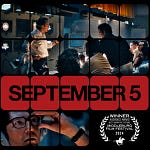Happy July! We’re excited to start our new series of nautical-themed movies. We begin with Master and Commander: The Far Side of the World directed by Peter Weir.
Anna LOVES this movie. Casey thinks it’s pretty good. One thing no one can argue with is that the attention to historical detail in this film is impressive. A love for the time period radiates from Master and Commander, and the commitment to accuracy gives the film a level of immersiveness that’s rarely achieved.
We hope you enjoy this free episode! The schedule for the rest of July is:
July 8 - Das Boot
July 15 - The Life Aquatic with Steve Zissou
July 22 - The Big Blue
July 29 - The Hunt for Red October














